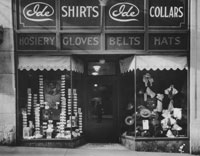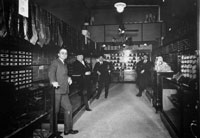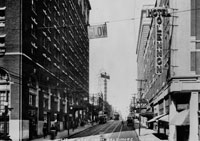Truman and Eddie Jacobson opened their clothing store on November 28, 1919. They rented their 18 by 48 foot store, one of five store fronts on the ground floor of the newly renovated Glennon Hotel, for $350 a month. Ted Marks, a close friend of Truman's, remembered how the two partners ran their store: "Harry would get around a lot, you know, and was mixing with people. He never stayed in the store all day--he would get out and go to lunches and mix with people, you know. He was very well known in that way and Eddie Jacobson would stay around and take care of the business." (Ted Marks oral history interview, Truman Library, 1962). "...The main thing I recall about the haberdashery," another friend of Truman's remembered, "is buying these Van Heusen collars that just came out about that time that were supposed to remain in shape and not wilt in the summertime, and that's where I bought my Van Heusen collars." (Charles F. Curry oral history interview, Truman Library, 1965.)
Battery D veterans often dropped in to see their old Captain. "We all worked there and we all used to go up there once in a while at noontime," former Battery D sergeant Frederick J. Bowman remembered. "We'd walk around and go up there to Twelfth and Baltimore…. We used to walk up around there and sometimes you'd see some of the fellows in there that would just come in to say hello…." (Frederick J. Bowman oral history interview, Truman Library, 1972.) "I used to go there every time I was downtown," former corporal Harry Murphy recalled. "It was sort of a headquarters. You went in there to find out what was going on…. [It] was a news center." (Harry E. Murphy oral history interview, 1970.)
Truman and Jacobson, whose business was probably never very strong, failed after about three years. An economic downturn caused even Truman's Battery D friends to postpone their purchases in Truman and Jacobson. "…A lot of the fellows that could have bought something," Frederick J. Bowman recalled, "would say, 'Well, I need a couple of shirts, but I think I'll wear these a while longer,' because they just didn't have the money to buy any." A going-out-of-business sale was held in September 1922. Truman reflected on this painful experience many years later: "A flourishing business was carried on for about a year and a half and then came the squeeze of 1921. Jacobson and I went to bed one night with a $35,000 inventory and awoke the next day with a $25,000 shrinkage.... This brought bills payable and bank notes due at such a rapid rate we went out of business." (Handwritten autobiographical manuscript, 1945, Truman papers, President's Secretary's Files.)
Eddie Jacobson declared bankruptcy in 1925. Truman struggled with his share of Truman and Jacobson's debts until he paid off the last bank loan, at a deep discount, in 1935. Shareholders who bought the approximately 140 shares of common and preferred stock that the partners sold in 1921 lost their investment. Truman's cousin, Mary Ethel Noland, remembered how some of the Truman family felt about Harry's failure: "Well, we of course were sorry that he didn't make a go of it, but we couldn't feel that that was Harry's life work any more than farming had been, and I think we just took it without too much concern, because we all felt that he hadn't gotten into the thing that would bring out the best that was in him." (Mary Ethel Noland oral history interview, Truman Library, 1965.)
Truman & Jacobson was located at 104 West 12th Street in the Glennon Hotel (above left).


